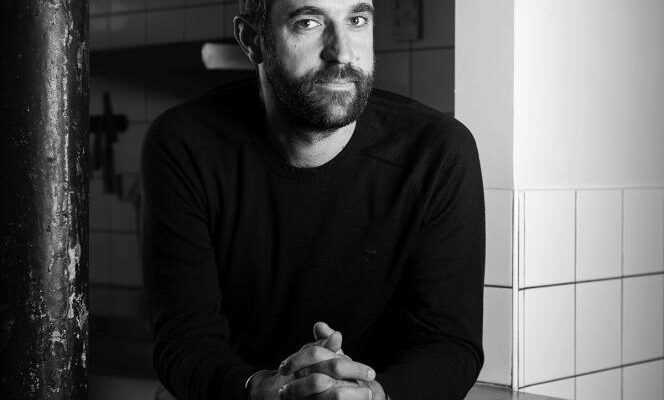“I grew up on the family farm, in Jazeneuil in Poitou-Charentes, a mixed crop-breeding region. As a child, I cultivated my vegetable garden, I sold my vegetables to the family, I took care of the chickens, I collected their eggs and sometimes I killed them to make some pocket money. I would check the price of food at the supermarket and add two francs per kilo because it was organic and I sold them directly to my parents, in a short circuit.
It was the school of life, a happy childhood, anchored in the earth and free as the air, always by bike, surrounded by nature and animals – until I was 14, when a fire ravaged the farm and destroyed my father, who committed suicide shortly after swallowing pesticides. Life then was very hard, the farm was sold four years later, but my mother continued to use the leased land to pay off the debts.
At the end of the food chain
My father, who wanted to be an agricultural engineer, suffered from not being able to choose his profession. This is why our parents urged me and my sister to work well in school and to study, in order to be able to have a choice.
After my baccalaureate S, I tried a DUT in chemistry, then a preparation for physiotherapy, I was a salesman at 19 in a garden center, and I ended up taking a competition for a IUT in communication, which gave me led to an internship in the drafting of The New Republic in Poitiers, at the sports department. It was a revelation: I got paid to tell stories, and I loved it. In the end, it was journalism and openness to others that saved me. I went to Paris to work at France 2, where I dealt with all kinds of subjects, including agriculture.
“Today, we are starting to reconcile the agricultural and urban worlds, those who produce, those who transform and those who consume. “
Despite the family tragedy, I still love the land and I want to defend those who nourish us. Hence my film In the name of the earth, my chain CultivonsNous.tv and the book of the same name, which are devoted to farmers. It is essential to talk about them and to connect the earth to the plate. For too long, we have thought “in silos” about agriculture, food and the environment. Today, we are beginning to reconcile the agricultural and urban worlds, those who produce, those who transform and those who consume.
The kitchen has always lived in me. I cook every day, and I have become the co-owner of two Parisian restaurants that work with vegetables directly from the kitchen garden. For me, it makes sense to be at the end of the food chain (I also have my BPREA, or Farm Manager’s Certificate).
Poitevin stuffed is a dish that I ate all my childhood, and I continue to eat it when I go to Poitiers to stay with my mother, who is now retired. But it is also an emblematic dish of my region, a peasant dish, made with cabbage, leftover bacon and rustic green vegetables (salads mounted in seeds for example), which is also a festive dish, which we share during the harvest or for weddings. It’s a kind of green pâté that connects me to my land, its flavors and its generosity. “
Let’s cultivate We, eat well with the peasants of today, under the direction of Edouard Bergeon, Les Arènes, November 2021, € 29.90.
